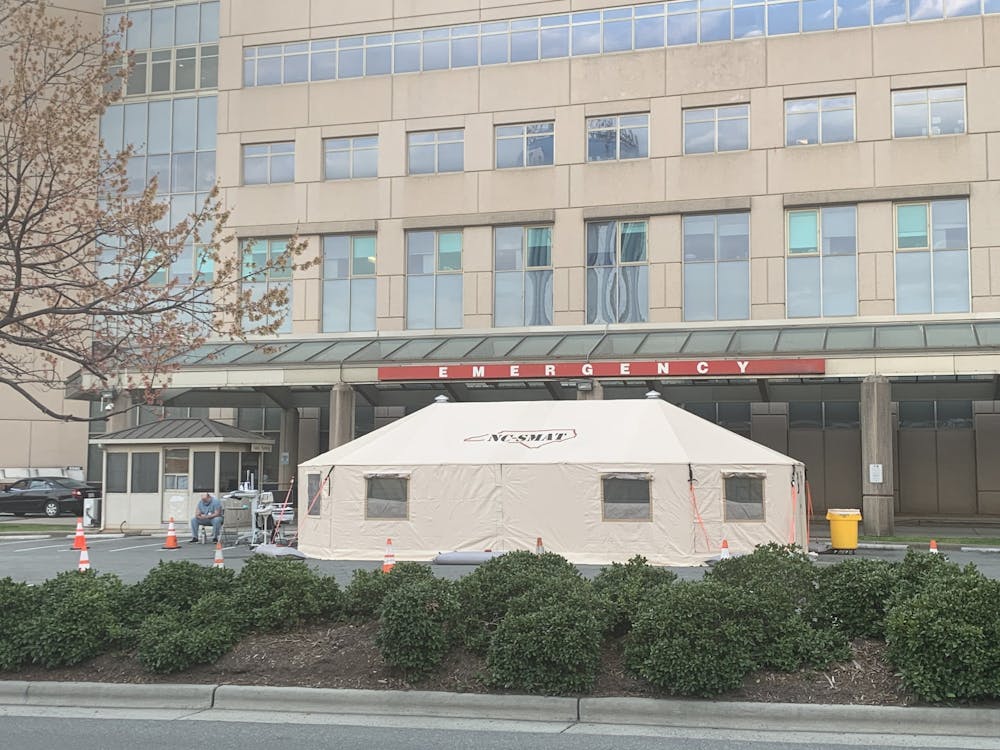“We weren't prepared, and now that we're gearing up, the entire world is competing for the same supplies,” Jackson said. “... It's incredibly important that folks are taking this seriously and doing what they can to not spread the virus. We've seen exponential growth in the last nine days."
Joseph Eron, chief of the Infectious Diseases Division, said UNC Hospitals are taking precautions to make sure the virus doesn’t spread between patients. He said there is a clear separation of confirmed and suspected coronavirus patients and the rest of the hospital, including separate treatment spaces and medical staff.
“The fact that we at UNC Health Care have a test that’s available, and we’re testing as many people as we possibly can is quite an accomplishment despite the delays from the federal government, from the FDA,” he said.
UNC Health has formed a COVID-19 response group of health care experts to address the pandemic at the state level.
Buchanan said that in Chapel Hill, doctors are seeing about 150 people per day at a respiratory diagnostic center. An additional 100 to 150 people are being tested at operating centers across the state. Not all patients tested are positive for COVID-19, he said.
Eron said the Chapel Hill Infectious Disease Clinic at UNC Hospital has tested about 300 people in the past three days.
“We are essentially testing people who are driving up in their cars,” Eron said. “Again, to limit risk to them and risk to others. It’s really quite remarkable.”
Supporting staff and patients
The outbreak is impacting more than just the emergency and intensive care wards of UNC Hospitals.
Samantha Meltzer-Brody, chairperson of the Department of Psychiatry in the UNC School of Medicine, said she and her colleagues are working hard to make telehealth appointments available for psychiatric patients. She said her team is separating emergency behavioral health patients from those with respiratory issues to avoid additional COVID-19 exposure.
“That’s a real opportunity — especially since there’s limited mobility for people,” she said.
Meltzer-Brody said she is also seeing a shift in insurance companies, who are beginning to cover telehealth appointments that they haven’t in the past.
To get the day's news and headlines in your inbox each morning, sign up for our email newsletters.
Providing care during the coronavirus outbreak is a collaborative effort, she said.
“We are thinking broadly how we can serve not only the population in Chapel Hill and our health care providers here, but how can we support the whole UNC Health Care System as it spans across the state too,” she said. “It’s a lot for us to think about.”
The uncertainty of the virus and social distancing, Meltzer-Brody said, has the potential to worsen mental health symptoms for behavioral patients. Even people without a history of mental health issues can begin to experience depression and anxiety during this time, she said.
Meltzer-Brody said stress and behavioral health apply to doctors and nurses too.
“We are working very hard to expand the footprint we’re offering to our employees — to our doctors, nurses and all other health care employees working in the hospital — to have emotional support,” she said. “This is obviously enormously stressful for health care providers and the stress of working in these conditions is difficult.”
She said UNC Health has recently expanded a mental health hotline for health care providers.
Moving forward
The status of COVID-19 in the United States is changing rapidly. With talk of flattening the curve of cases to prevent overwhelming the health care system, Buchanan said he and his colleagues are thinking ahead.
Buchanan said he has considered a possible spike in demand for in-patient beds and ICU beds and has thought through how UNC Hospitals might meet increased demand.
“We have tried contingency plans in place and ready to deploy should the need arise,” he said.
But Buchanan said the best way for people to alleviate pressure on the health care system is to be respectful of social distancing. He said this especially applies to young people.
“They need to stay home and monitor themselves,” Buchanan said. “That’s the way that we will have the best chance to decrease the rate of spread of the infection — and therefore decrease the chance that our health system and other health systems in the state and the nation will be overwhelmed by acutely ill patients.”
@alliemkelly
university@dailytarheel.com



